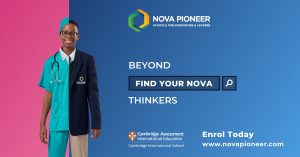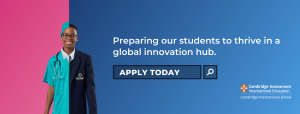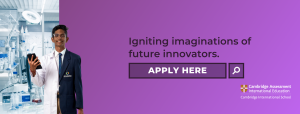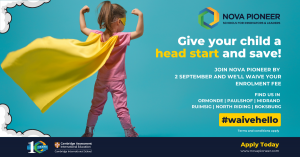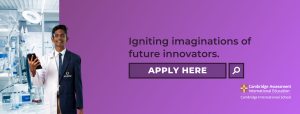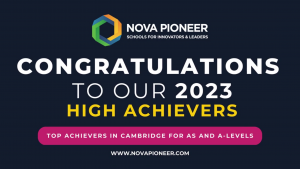Celebrating academic distinction at Nova Pioneer with commendable performances in their Cambridge A-Level, AS-Level and IGCSE examinations. Nova Pioneer Schools, a pan-African independent school group that builds and operates world-class, affordable schools, offering students grades from preschool through to senior school, with established campuses in South Africa and Kenya,
Celebrating academic distinction at Nova Pioneer with commendable performances in their Cambridge A-Level, AS-Level and IGCSE examinations.
Nova Pioneer Schools, a pan-African independent school group that builds and operates world-class, affordable schools, offering students grades from preschool through to senior school, with established campuses in South Africa and Kenya, proudly announces the noteworthy achievements of their students in the Cambridge A-Level, AS-Level and IGCSE examinations.
The school network offers Cambridge, an internationally accredited curriculum, where students can write their A-Level, AS-Level and IGCSE examinations, across their Ormonde, Midrand and West High Schools. The noteworthy performance of these learners is a testament to the innovation-driven education provided by Nova Pioneer, which is dedicated to developing future leaders and Innovators for the African Century.
Student Spotlight
Top performing A-Levels student, Isabel Enechi, who is set to study Dentistry in the European Union, exemplifies the high calibre of Nova Pioneer’s students. “I am particularly proud of my classmates who successfully completed the year – it was collectively one of our most difficult years, and witnessing the resilience and determination within our cohort has been a great source of inspiration.”
Enechi credits her achievements to the school’s ethos. “My school has played a crucial role in my journey by instilling in us culture principles like ‘Joy of Learning’ and ‘Always Growing’. The push for ongoing learning and growth has fueled my interest in Health Sciences and my passion for Dentistry”, she adds.
Nova Pioneer’s commitment to excellence is further reflected in the accomplishments of its AS Level scholars. Arjun Thulsie, recipient of the University of Pretoria’s (UP) Dux Scholar Award and future UP Actuarial Science student, is testament to the resilient spirit and academic prowess fostered at Nova Pioneer. “Looking back I am the most proud of having the opportunity to give back some good results to the Nova Pioneer Ormonde community, it’s a shared victory.”
In moments of hardship, Nova Pioneer’s supportive community has been pivotal. “When times were uncertain and life was really happening to my family and I, Nova Pioneer gracefully offered a helping hand. I will be eternally grateful to everyone at Nova Pioneer for embracing my pursuit of knowledge. Since day one, Nova Pioneer has academically supported and cheered me on through the world’s best teachers!”, shares Thulsie, emphasising the school’s nurturing environment.
Fellow classmates, Kewell Moodley, who secured the top position globally for Cambridge International IGCSE Business Studies in 2022, and Ungowakho Madolo, were both recently accepted for a Biomedical Engineering degree at the University of the Witwatersrand.
“Not only did our amazing teachers help me significantly, but the culture principle of ‘High Expectations’ stuck with me throughout. The idea that we should always strive to do our best and compete only with our past selves helped me a lot. I can’t forget all the wonderful people at Nova Pioneer who kept me sane,” said Madolo.
Nova Pioneer’s IGCSE students, who have exceeded expectations with a total of 32 A*, 85 A’s, 198 B’s and 239 C’s, felt a sense of relief and excitement, and concurred that they were ready to tackle the new year head-on.
With aspirations to pursue a range of careers from Nanotechnology, Thermodynamics, Chemical Engineering, Biomedical Engineering, Medicine and Finance, students are pleased that all the hard work they have put in has paid off.
When asked about their journey in class, Bhavesh Thulsie from Grade 10 IGCSE said, “Nova Pioneer has helped by providing amazing teachers and a coach who were always available and willing to help and always provided helpful and meaningful feedback.”
Simphiwe William a Grade 10 IGCSE student said, “I am most proud of how I was able to prepare myself mentally, physically, and emotionally for my examinations. The teachers motivate and encourage us. They were always there to assist us with any and all questions we had. Nova really helped us stick to their culture principle of ‘High Expectations’.”
Theuns Opperman, the school leader for Nova Pioneer Ormonde Secondary, said, “Our students have performed exceptionally well and we are proud of all our learners and their individual accomplishments! Nova Pioneer has a record of achieving a 90%-100% pass rate at A-levels and we are happy to report that this has been accomplished once more”.
“In the coming weeks, as data becomes available from Cambridge International, we will be comparing our students’ performance to that of students worldwide and fully expect our students to continue Nova Pioneer’s custom of outperforming global benchmarks,” said Opperman.
“It brings immense joy to partake in the triumphs of our students and the enthusiasm they exude for their future endeavours. Listening firsthand to their stories, it’s clear that Nova Pioneer has constructed a strong base for their dreams. The outcomes they’ve achieved are a testament to our students’ persistent efforts and resolve, augmented by the unwavering encouragement and motivation provided by their educators,” expressed Opperman.
“Innovation in education is at the heart of Nova Pioneer’s curriculum, empowering its students with not only knowledge but also the culture principles essential for leadership and lifelong learning. As Nova Pioneer celebrates these young achievers, it continues to pioneer a path of academic and personal development, setting its students on a trajectory towards becoming the leaders and innovators the world needs,” said Opperman.
Cultivating a Foundation for Student Achievement
Cambridge is a flexible curriculum that offers students a number of pathways for exit. At a senior school level, there are three main exit examinations: IGCSE which is Cambridge’s version of a General Academic Literacy band, followed by AS and then A-levels. A-Levels are a recommended 13th year at a high school level and provides students a world-recognised and very highly regarded exit qualification to widen the scope of their university studies both locally and internationally. Depending on how students perform in their IGCSE and AS levels, A-levels improves their exit results and gives students the opportunity to improve their options of getting into their preferred course.
Nova Pioneer works closely with each student and their families, often as early as Grade 8, to create an individual pathway. Families are consulted throughout their time at Nova Pioneer Ormonde to ensure clarity and understanding of the recommended exit pathway.
As a school network, Nova Pioneer also does extensive predictive work and is happy to report that their AS and A-level students performed in line with or better than expected, whilst their students writing IGCSE outperformed all expectations. Many of their AS students have opted to stay with the school for A-levels to ensure an even more competitive set of results.
Ready to Excel Beyond the Classroom
Departing Nova Pioneer students who have completed their A-Levels, leave feeling confident as they know what they want to pursue beyond school. Chief of Schools, Rahel Wondwossen says this was made possible through the support of the Post School Success (PSS) Team and the school’s Psycho-social Support Team.
Wondwossen explains, “We established the PSS Team with the aim of equipping students with practical tools for preparation in life after school. The team supports students in understanding their options and what benefits and challenges each may come with.”
The PSS team, in collaboration with the Psycho-social Support team, provides students with personalised assessments and career guidance based on each of their unique talents and skills. Nova Pioneer’s emphasis on critical thinking, problem-solving, and leadership training is rooted in their vision to empower generations of innovators who will drive progress across the continent. The PSS Team’s strategy is particularly integral, as it guides students in their exploration of career and higher education options, equipping them with practical tools and knowledge for life after school.
Wondwossen added, “By focusing on the unique strengths and interests of each student, Nova Pioneer fosters a community of forward-thinking leaders. The nurturing of such talent is essential to their mission of influencing the socio economic landscape of Africa, which requires a cadre of creative and adaptable leaders.”
“In addition to academic excellence, the school pledges continued engagement with its alumni, underscoring the importance of a supportive network in cultivating long-term success. The resilience and adaptability instilled in students are the qualities envisioned by Nova Pioneer to resonate through their alumni’s future initiatives and leadership roles, expressed Wondwossen.
As Nova Pioneer celebrates these achievements, it strengthens its resolve to inspire and support students to shape a promising horizon for Africa.
